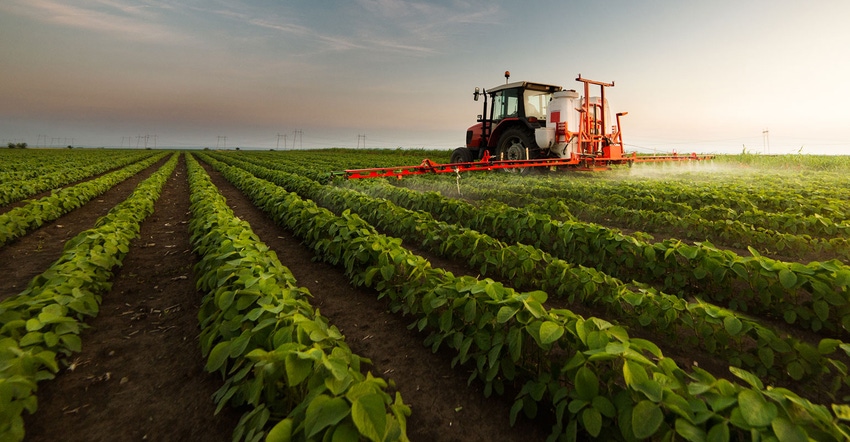
Gov. Andrew Cuomo has vetoed a bill that would have banned chlorpyrifos — Lorsban, Cobalt — in New York by law. Instead, he directed the Department of Environmental Conservation, through its regulatory process, to ban the pesticide by 2021. But farm groups view Cuomo’s decision as a victory that will enable regulators, and not legislators, to decide on the pesticide’s use.
Elson Shields, professor of entomology at Cornell University, said the use of chlorpyrifos in corn has dropped dramatically since the inception of Bt corn, which can effectively control corn rootworm.
But the chemical is still widely used in some vegetable crops and fruit trees. Art Agnello, professor and Extension Tree Fruit Entomologist at Cornell, said the pesticide is still widely used in apples.
“Most in the industry feel that the restrictions already in place regarding its use are adequate and appropriate to the potential risks frequently cited by those in favor of banning it, at least in regard to nontarget effects and farmworker-consumer exposure,” Agnello said. “However, I agree that it is an old chemical with a long residual profile and tends to persist at detectable levels late into the season, so I understand the rationale for wanted it to be removed. Most growers will need to spend more on alternative products once it is gone, some of which will be not be as effective and will likely require a greater number of sprays.”
Agnello compiled a list of alternatives that might work for certain fruits:
Apple
Dogwood borer. Acetamiprid (Assail, UPL)
Black stem borer. Fenpropathrin (Danitol, Valent) and lambda-cyhalothrin (Warrior)
American plum borer. No other product registered
San Jose scale. Other products labeled prebloom include:
Flupyradifurone (Sivanto, Bayer)
Buprofezin (Centaur, Nichino)
Pyriproxyfen (Esteem, Valent)
Burkholderia (Venerate, Marrone)
Rosy apple aphid. Other products labeled prebloom include:
Flupyradifurone (Sivanto, Bayer)
Pyriproxyfen (Esteem, Valent)
Cyantraniliprole (Exirel, FMC)
Flonicamid (Beleaf, FMC)
Cherry
San Jose scale. Other products labeled prebloom include:
Flupyradifurone (Sivanto, Bayer)
Acetamiprid (Assail)
Buprofezin (Centaur, Nichino)
Pyriproxyfen (Esteem, Valent)
American plum borer. Others are mostly pyrethroids.
European fruit lecanium. Other products labeled prebloom include:
Buprofezin (Centaur, Nichino)
Pyriproxyfen (Esteem, Valent)
Peach
San Jose scale. Other products labeled prebloom include:
Flupyradifurone (Sivanto, Bayer)
Acetamiprid (Assail)
Buprofezin (Centaur, Nichino)
Pyriproxyfen (Esteem, Valent)
American plum borer. Others are mostly pyrethroids.
Positive reaction from agriculture
There were concerns that a legislative ban on chlorpyrifos would set a precedent for legislators to eventually go after more well-known chemicals, such as glyphosate, but that effort died at Cuomo’s desk.
New York Farm Bureau, which has long opposed the bill, supported the veto.
“All action on pesticide use should rest with DEC and it's established review process versus the go-around the legislature attempted to do with the bill,” said spokesman Steve Ammerman. “Chlorpyrifos has been an effective and safe tool for farmers for decades and while the eventual ban will pose challenges to food production, we will continue to work with DEC on its evaluation process and finding alternative products for farmers.
“Through his veto, the governor understands that there are new threats from invasive species to agriculture and a permanent legislative ban would have ruled out all future use should it be needed.”
In a statement, Cuomo said that chlorpyrifos has the potential to cause serious health problems to people who ingest it. But he rejected the bill because it bypassed the state’s regulatory process and substitutes “the legislature’s judgement for the expertise of chemists, health experts and other subject matter experts in this field.”
Cuomo directed the Department of Environmental Conservation to phase out chlopyrifos use statewide by July 2021. According to an article in Bloomberg, the process will involve a public comment period.
Colleen Klein, executive director of the New York Corn and Soybean Growers Association, was also pleased with the veto.
“We are pleased that the governor has vetoed the banning of the use of chlorpyrifos and has chosen to uphold the administrative regulatory process by which the Department of Environmental Conservation needs to do its job,” she said in a statement. “There is still much work to be done to ensure that our farmers continue to have access to crop protection tools that have been proven by the [U.S.] EPA and the NYS DEC to be safe and effective, and we will continue to work diligently with our industry partners and governmental agencies on their behalf as this issue progresses.”
Peter Lehner, managing attorney for sustainable food and farming at Earthjustice, said in a statement that the organization supports the effort to start the regulatory process to get chlorpyrifos banned but is disappointed that the overall bill was vetoed.
“The science is clear and beyond dispute. New York must ban chlorpyrifos to protect public health. We also applaud Sen. [Todd] Kaminsky and Assemblyman [Steve] Englebright for their leadership in sponsoring the bill, passed by the legislature last April, that would have banned chlorpyrifos in New York and has led to today’s action. Unfortunately, the governor is relying instead on a regulatory process. We will monitor DEC’s actions closely to make sure there is no delay in the agency’s fulfilling the governor’s promise to New Yorkers,” he said.
Federal action
The U.S. Environmental Protection Agency decided last summer to not ban chlorpyrifos after it was ordered last April to issue a final decision on objections to the pesticide’s use.
Chlorpyrifos has been used as a pesticide since 1965 in both agricultural and nonagricultural areas and was produced by Dow Chemical.
According to EPA, the largest agricultural market for chlorpyrifos in terms of total pounds of active ingredient is corn, but it is also used on soybeans, fruit and nut trees, and other fruits and vegetables. Chlorpyrifos is currently undergoing a registration review, a program that re-evaluates all pesticides on a 15-year cycle.
EPA said that it will complete its review deadline by Oct. 1, 2022.
California and Hawaii have passed bans on chlorpyrifos and other states have proposed bans, too.
About the Author(s)
You May Also Like






